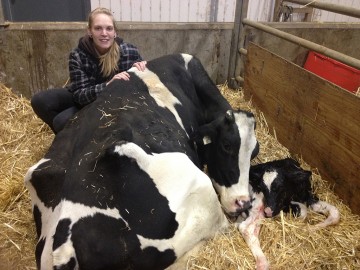
You Can Tell a Lot About a Cow from Their Hair
Sept 8, 2015
If you can measure stress in human hair, could you do the same in cow hair? One LFS grad student, Tracy Burnett, decided to find out as part of her master’s degree research.
“Cortisol is a stress hormone,” said Burnett, an Animal Reproduction PhD student, supervised by Prof. Ronaldo Cerri. “By measuring the amount of cortisol in cows’ hair, we have the potential to tell if the dairy cows have experienced chronic stress.”
In a paper published in the Journal of Dairy Science, Tracy’s research showed that dairy cows afflicted with multiple diseases had higher hair cortisol concentrations than those of healthy animals, which could mean that these animals were experiencing chronic stress. This method is novel because, unlike blood testing where cortisol measurements can become distorted if the cattle become stressed during the process, using hair samples is not invasive.
“Lactating dairy cows are often faced with stressful situations such as a change in their housing environment or feed type, or having to produce a high amount of milk right after giving birth,” she said. “It’s important to research the effects different challenges have on dairy cows so we can develop practices that are associated with less acute and chronic stress.”
As an undergraduate student in the Faculty of Land and Food Systems, Tracy discovered the courses she loved most were centered on reproductive physiology and animal welfare. During her third year, she worked at the UBC Dairy Education and Research Centre – an opportunity that sparked her interest in dairy cattle research and led her to pursue her PhD. Her research currently focuses on increasing the reproductive efficiency of dairy cattle while minimizing the use of fertility protocols.